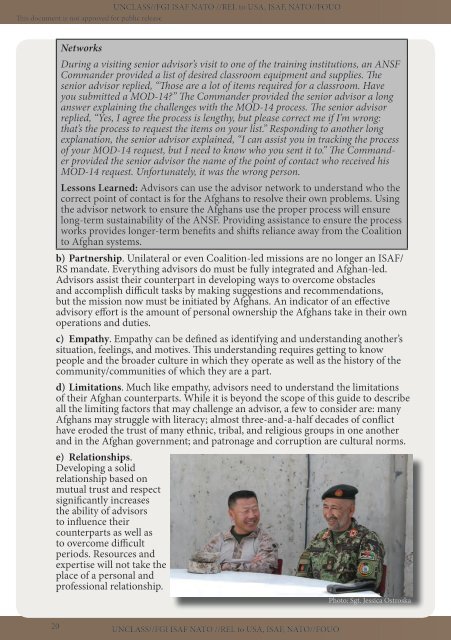20140927_NIU_CJ7_TREX_SFA guide 3.1
20140927_NIU_CJ7_TREX_SFA guide 3.1
20140927_NIU_CJ7_TREX_SFA guide 3.1
You also want an ePaper? Increase the reach of your titles
YUMPU automatically turns print PDFs into web optimized ePapers that Google loves.
UNCLASS//FGI ISAF NATO //REL to USA, ISAF, NATO//FOUO<br />
This document is not approved for public release<br />
Networks<br />
During a visiting senior advisor’s visit to one of the training institutions, an ANSF<br />
Commander provided a list of desired classroom equipment and supplies. The<br />
senior advisor replied, “Those are a lot of items required for a classroom. Have<br />
you submitted a MOD-14” The Commander provided the senior advisor a long<br />
answer explaining the challenges with the MOD-14 process. The senior advisor<br />
replied, “Yes, I agree the process is lengthy, but please correct me if I’m wrong:<br />
that’s the process to request the items on your list.” Responding to another long<br />
explanation, the senior advisor explained, “I can assist you in tracking the process<br />
of your MOD-14 request, but I need to know who you sent it to.” The Commander<br />
provided the senior advisor the name of the point of contact who received his<br />
MOD-14 request. Unfortunately, it was the wrong person.<br />
Lessons Learned: Advisors can use the advisor network to understand who the<br />
correct point of contact is for the Afghans to resolve their own problems. Using<br />
the advisor network to ensure the Afghans use the proper process will ensure<br />
long-term sustainability of the ANSF. Providing assistance to ensure the process<br />
works provides longer-term benefits and shifts reliance away from the Coalition<br />
to Afghan systems.<br />
b) Partnership. Unilateral or even Coalition-led missions are no longer an ISAF/<br />
RS mandate. Everything advisors do must be fully integrated and Afghan-led.<br />
Advisors assist their counterpart in developing ways to overcome obstacles<br />
and accomplish difficult tasks by making suggestions and recommendations,<br />
but the mission now must be initiated by Afghans. An indicator of an effective<br />
advisory effort is the amount of personal ownership the Afghans take in their own<br />
operations and duties.<br />
c) Empathy. Empathy can be defined as identifying and understanding another’s<br />
situation, feelings, and motives. This understanding requires getting to know<br />
people and the broader culture in which they operate as well as the history of the<br />
community/communities of which they are a part.<br />
d) Limitations. Much like empathy, advisors need to understand the limitations<br />
of their Afghan counterparts. While it is beyond the scope of this <strong>guide</strong> to describe<br />
all the limiting factors that may challenge an advisor, a few to consider are: many<br />
Afghans may struggle with literacy; almost three-and-a-half decades of conflict<br />
have eroded the trust of many ethnic, tribal, and religious groups in one another<br />
and in the Afghan government; and patronage and corruption are cultural norms.<br />
e) Relationships.<br />
Developing a solid<br />
relationship based on<br />
mutual trust and respect<br />
significantly increases<br />
the ability of advisors<br />
to influence their<br />
counterparts as well as<br />
to overcome difficult<br />
periods. Resources and<br />
expertise will not take the<br />
place of a personal and<br />
professional relationship.<br />
Photo: Sgt. Jessica Ostroska<br />
20<br />
UNCLASS//FGI ISAF NATO //REL to USA, ISAF, NATO//FOUO


